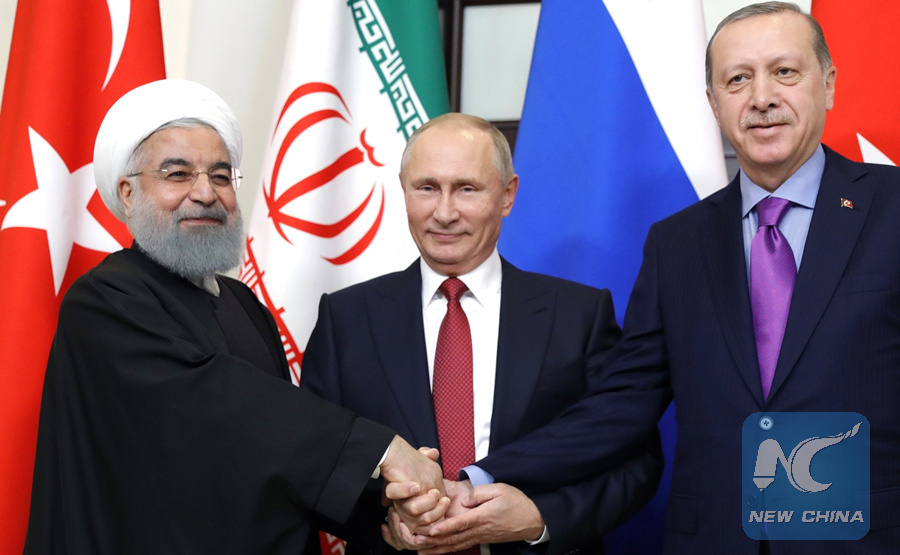
The Presidents of Russia, Iran and Turkey hold hands in Sochi, Russia, on Nov. 22, 2017. (TASS Photo)
MOSCOW, Nov. 23 (Xinhua) -- Russia, Iran and Turkey face the arduous task of ironing out the drastically different positions of the stakeholders during a peace process in war-torn Syria initiated by the troika in a symbolic meeting Wednesday.
The presidents of the three countries agreed in Russia's Black Sea resort of Sochi to shift their focus to a political settlement as the Islamic State terrorists are being expelled from Syria by Damascus troops backed by Russian warplanes.
The three leaders in a joint statement expressed support for "a broad intra-Syrian dialogue" among all segments of Syrian society, calling on representatives of the Syrian government and the opposition to participate constructively in the upcoming Syrian National Dialogue Congress in Sochi.
"The agreements between Russia, Turkey and Iran are a proof of the fact that they have taken the initiative to solve Syria's crisis and will not give it up," said Konstantin Kosachev, head of the Russian Federation Council's Foreign Affairs Committee.
PRODUCTIVE MEETING
The joint statement issued after the Sochi summit "has laid a practical basis" for the beginning of a political process in Syria, said Elena Suponina, an advisor to the director of the Russian Institute for Strategic Studies.
It was very difficult to bring together the positions of these countries and many did not believe that Turkey and Iran could sit at the same table and agree on something, let alone begin practical work, she said.
Kosachev pinned high hopes on the Syrian National Dialogue Congress, which was proposed by Moscow in late October at the Astana talks in Kazakhstan.
"In early December, the congress will be held. Much is expected as it can become a catalyst for the intra-Syrian talks in Geneva. If the congress is a success, it will be able to provide the Geneva talks with essentially ready-made solutions," he said.
"In any case, the success of the unique tripartite summit cannot be over-emphasized. This is an example of effective diplomacy and the capacity of three very different powers to come to terms and act for the sake of common interests," said the senior lawmaker.
PITFALLS AHEAD
"The main task now, which is also the main difficulty, is to conjugate the efforts of Russia, Iran and Turkey with the efforts of the Arab states in the Persian Gulf and the United States during the political process," said Suponina.
Shortly before the Sochi summit, Russian President Vladimir Putin had intensive contact with the leaders of the United States, Saudi Arabia, Egypt and Israel to seek common ground.
"If these efforts succeed, there certainly will be progress. But it is obvious that there are a lot of pitfalls ... The Kurdish problem alone can create many difficulties, not to mention a number of radical groups in Syria," she said.
She believes that the current situation is very fragile as everything depends on the political will of not only Russia, Iran and Turkey but also other countries that have an impact.
"The participation of Iran and Turkey in the peace process has largely deprived the United States of maneuvering space in Syria. However, Washington is reluctant to abandon the region, where it has interests," said Yuri Pocht, a professor with the Peoples' Friendship University of Russia.
Suponina said the upcoming Syrian National Dialogue Congress is of symbolic significance, but breakthroughs shouldn't be expected.
She said that Putin in his recent speeches repeatedly mentioned the United Nations (UN)-backed Geneva process, where Russia has less influence than in the Astana talks.
On Friday, UN Special Envoy for Syria Staffan de Mistura will visit Moscow to meet Russian Foreign Minister Sergei Lavrov and Defense Ministry officials. Enditem

